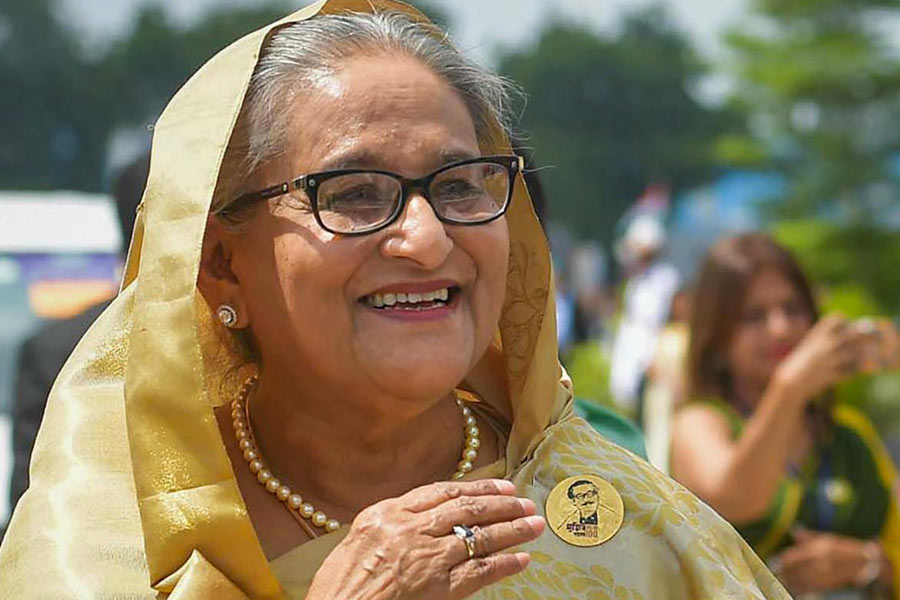The minority community in Bangladesh is hopeful that the fifth Sheikh Hasina government — fourth in a row — will meet some of its long-standing demands that have been part of the Awami League manifesto for over 10 years, but have not been delivered as yet.
President Mohammed Shahabuddin administered the oath to Hasina, along with 25 ministers and 11 ministers of state, on Thursday evening following which several senior ministers said that the priority of the government will be to deliver on the promises that the Awami League had included in its manifesto.
“This assurance makes us hopeful that the ruling party will keep the promises that they have made to the minority communities, which have always stood behind the Awami League,” said Rana Dasgupta, general secretary of Bangladesh Hindu Buddhist Christian Oikya Parishad, an umbrella organisation championing minority rights in the Muslim majority country of over 170 million people.
The last few years have witnessed a rise in atrocities against minority communities — Hindus, Christians, Buddhists and other minorities comprise around 9 per cent of the population — in Bangladesh. At the same time, Islamist fundamentalist forces have gained in strength. The minority organisations have been urging the government to ensure their protection through proper legal provisions.
Successive regimes under Hasina concurred with these demands and even included them in their manifestos, but didn’t deliver, rued Dasgupta.
The demands that found a place in the Awami manifesto include the enactment of the Minorities Protection Act, Elimination of Discrimination Act and Intestate Property Conservation Act, the formation of the National Commission for Minorities, proper implementation of the Transfer of Entrusted Property Act and Hill Peace Agreement and Hill Land Commission Act and the implementation of the Plaintiffs Act.
Since the Hasina government has begun its innings on a positive note by including four from the minority communities — Sadhan Chandra Majumdar as food minister, Samanta Lal Sen as health and family welfare minister, Narayan Chandra Chanda as land affairs minister and Kujendra Lal Tripura as minister of state in-charge of Chittagong Hill Tracts — in the 36-member cabinet that was sworn in on Thursday, Dasgupta and other minority leaders remain hopeful.
“We have been fooled in the past... We hope the experience will be different this time,” he added. Shahriar Kabir, filmmaker and human rights activist, said that civil society groups would have to put pressure on the government to implement the promises made in the manifesto and ensure the protection of the minorities.
“The government would also have to initiate the process of cracking down on pro-Pakistan and fundamentalist elements as these forces pose the biggest challenge to a secular and liberal Bangladesh,” he stressed.
Not just the civil society organisations, neighbouring India — which has often voiced concerns about minority rights in Bangladesh — also has very similar expectations from Hasina and her new cabinet. While most media outlets in Bangladesh hailed the composition of the newly sworn-in cabinet calling it a progressive and a modern team, a source in the Indian security establishment said it wastoo early to congratulate Hasina.
“It is true that there are young faces in the cabinet like education minister Mohibul Hosain Chowdhury from Chittagong, who is very progressive and liberal, but the same cannot be said about all the members of the cabinet... We have concerns about the Prime Minister’s overdependence on one of her senior advisors, whose proximity with Pakistan is well documented,” said the source.
“One of the key ministers in her cabinet is known for his links with Hefazat-e-Islam, a far-Right conservative Islamic advocacy group... We have to wait and see his performance in the coming days,” the source added.
Some of the initial comments from the new cabinet members, however, indicated that Team Hasina would walk the extra mile to counter fundamentalist forces and promote democratic values.
“Bangladesh will be a non-communal state, a democratic state... Fundamentalism and bigotry are anti-democratic,” Mohammad A. Arafat, the new information minister, wrote in his X account on Friday, giving the call for abandoning fundamental and communal mentalities.
The appointment of Arafat as the information minister drew applause from people like Dasgupta and Kabir as the young management professor has been a symbol of secular and liberal values and has often made bold statements against fundamentalist forces.
“Some of these new appointments in the cabinet are indeed encouraging... But we want the government to walk the talk and fulfil its promises,” said Dasgupta.
According to him, the government owes the enactment of the legislation to over 1.5 crore people belonging to the minority communities, who responded to Hasina’s call and turned up at the polling booths in large numbers — by defying the BNP’-led Opposition’s vote boycott call — and helped the poll percentage reach a respectable 41.8 per cent.
Ensuring a decent voter turnout in the election was the biggest challenge for the Hasina administration as the BNP had created a narrative that the people of Bangladesh were not interested in the elections. Not just the Awami League machinery, several voluntary organisations worked across the country to create awareness of the need for voting on polling day.
“We reached out to people in remote areas through small programmes and highlighted the development work carried out by the government through small programmes... It is heartening that people did respond to our call and came out to vote.
“We reached out to people in different parts and highlighted the development work carried out by the government through small programmes... It is heartening that people did respond to the call of the Prime Minister and came out to vote. We hope the new government will take Bangladesh to a higher trajectory of growth and development,” said Mohona Akhter, a banking professional, who carried out campaigns in the Thakurgaon district to encourage people to go to the polling stations on January 7.











